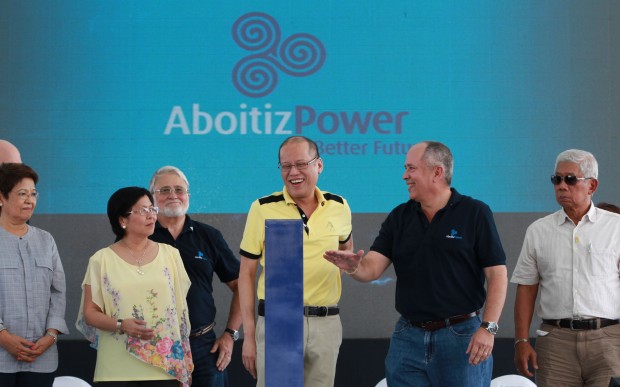
President Benigno S. Aquino III leads the Ceremonial Switch-on of the 300- Megawatt (MW) Davao Baseload Power Plant, Davao Base load Power Plant Complex, Boundary of Bgy. Binugao, Toril, Davao City and Bgy. Inawayan, Sta. Cruz, Davao Del Sur on Friday, January 8, 2016. Also in photo are Mindanao Development Authority (MinDa) chairperson Luwalhati Antonino, Department of Energy Secretary Zenaida Y. Monzada, Aboitiz Power Corporation CEO Erramon I. Aboitiz and Defense Secretary Voltaire Gazmin.
PHOTO BY BENHUR ARCAYAN / MALACAÑANG PHOTO BUREAU
Amid criticisms from environmental and activist groups, Malacañang on Saturday emphasized that coal-fired plants are necessary to prevent power outages in the country.
READ: Green groups see red over Davao coal plant
Undersecretary Manuel “Manolo” Quezon III of the Presidential Communications Operations office said over state-run Radyo ng Bayan that President Benigno Aquino III, who attended that inauguration of the 300-megawatt Davao Baseload Power Plant in Toril on Friday, already explained the need for coal-fired plants.
“Kailangan natin ng mga planta na gumagawa ng kuryente—rain or shine, day-in or day-out—sa tinatawag na peak capacity,” Quezon said.
(We need power plants that generate electricity – rain or shine, day-in or day-out – during peak capacity.)
He said base load plants are needed as reliable sources of electricity.
“Dahil sa limitasyon ng teknolohiya, hindi ito ma-pro-provide for now ng tinatawag na mga renewable sources of energy katulad po ng wind at hydropower,” he explained.
(Because of limitations in technology, base load cannot be provided by renewable sources of energy like wind and hydropower.)
Quezon said that while hydropower is an ideal source of energy because it does not produce greenhouse gas emissions, it is not as reliable because of global warming and illegal logging.
Nevertheless, the undersecretary pointed out that the percentage of renewables in the country’s energy mix has increased. The Philippines, he said, is in fact one of the countries that are low carbon emitters.
“Kung tayo naman ay mapipilitan na agarang magpatayo ng mga renewables, unang-una, mas mahal ito at dahil mas mahal ito mababawasan naman ang salapi na magagamit natin sa iba’t ibang mga proyekto,” he added.
(If we are forced to immediately set up renewable sources of energy, we might have problems because first of all it is expensive and because it is expensive we will have to divert funds that could be used for other projects.)
READ: Bayan hits Aquino’s participation in Carbon Pricing Panel
Quezon said the President already asked for technology transfer and financial assistance from developed countries during the 21st Conference of Parties in Paris last month.
“But, in the meantime, parang naiipit tayo sa isang situation e. Kunwari, ‘di ba, para lumago ang pangangalakal, para lumaki ang industriya para naman komportable ang ating mga kababayan, kailangan natin ng suplay ng kuryente na hindi lang sapat sa pangangailangan ngayon ngunit sapat para sa pangangailangan bukas at sa darating na mga taon at hindi naman agad-agad mapapatayo ito,” he said.
(But in the meantime we are caught in between. For example, if we get more trade, we would need energy supply that is enough for our needs now and for the future. It takes time to construct power plants.)
“So ito ‘yung tinatawag nating pagbabalanse ng ating energy mix. So hindi siguro dapat masyadong mag-worry ang ating mga kababayan, lalo na ang mga talagang nag-a-advocate ng ating (green energy),” Quezon added.
(That’s what we call having a balanced energy mix. So maybe our citizens and those advocating green energy should not worry too much.)
The Malacañang official said the promotion of renewable energy is included in the Aquino administration’s plans.
Groups like Bayan Muna earlier criticized Aquino for encouraging the construction of coal-fired power plants after pushing for the historic climate change agreement in Paris.
“President Aquino has fully exposed his hypocrisy to reduce carbon emissions to put a stopper on climate change. A few weeks after he has stood up, forehead up high, in front of world leaders demanding climate justice, he is now cutting the ribbon to a top contributor to global warming–coal-fired power plants,” Bayan Muna Representative Neri Colmenares said in a statement.
Colmenares, author of a House resolution calling for a moratorium on coal fired power plant construction and expansion, said coal “causes irreparable damage to health and environment.”
Bayan Muna Representative Carlos Zarate called Aquino “duplicitous.”
Aquino was among the leaders who went to Paris last year to call for a legally-binding agreement to address climate change. The Philippines was one of the 195 countries that approved what is now called the Paris Agreement on climate change. The agreement aims to limit global temperature rise to well below two degrees Celsius above pre-industrial levels.
READ: Nations adopt Paris agreement on climate change
The Philippines has also committed to reducing greenhouse gas emissions by 70 percent by 2030. However, the measures are conditional or will rely on assistance from the international community. CDG
READ: PH vows to lower carbon emissions 70% by 2030